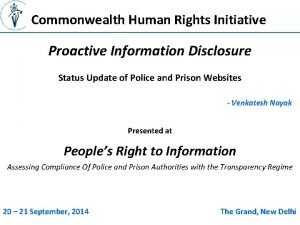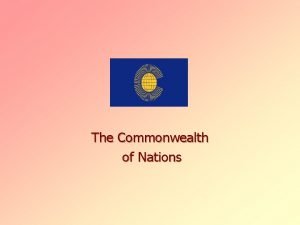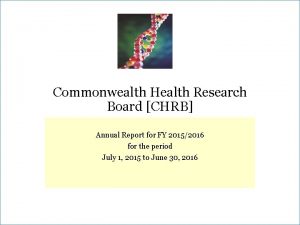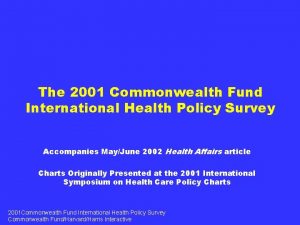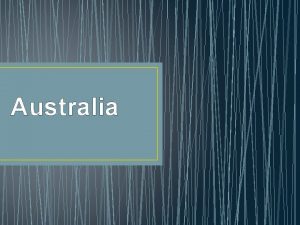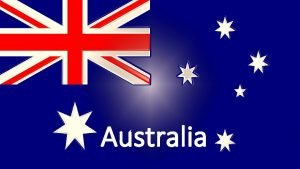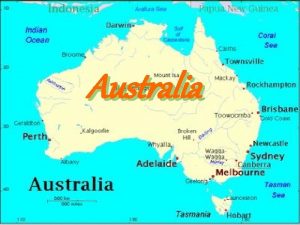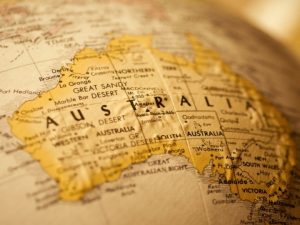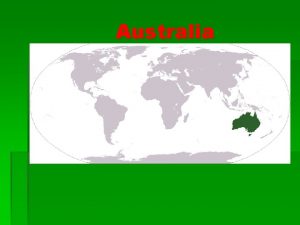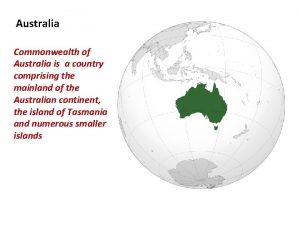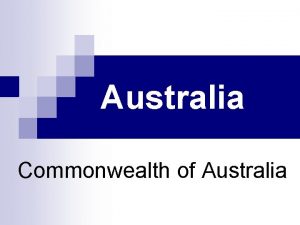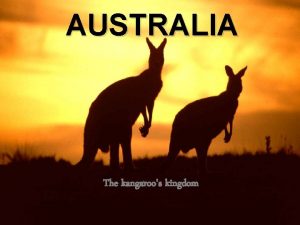Australia Timofeyev U A Australia Commonwealth of Australia












- Slides: 12

Australia Timofeyev U. A.

• Australia (Commonwealth of Australia)- sovereign country comprising the mainland of the Australian continent, the island of Tasmania, and numerous smaller islands. It is the largest country in Oceania and the world's sixthlargest country by total area. The neighbouring countries are Papua New Guinea, Indonesia, and East Timor to the north; the Solomon Islands and Vanuatu to the north -east; and New Zealand to the south-east.

Name • Name Australia (pronounced /əˈstreɪliə/ in Australian English) is derived from the Latin Terra Australis ("southern land"), a name used for a hypothetical continent in the Southern Hemisphere since ancient times. When Europeans first began visiting and mapping Australia in the 17 th century, the name Terra Australis was naturally applied to the new territories.

Geography • Surrounded by the Indian and Pacific oceans, Australia is separated from Asia by the Arafura and Timor seas, with the Coral Sea lying off the Queensland coast, and the Tasman Sea lying between Australia and New Zealand. The world's smallest continentand sixth largest country by total area, Australia — owing to its size and isolation — is often dubbed the "island continent", and is sometimes considered the world's largest island.

Climate • The climate of Australia is significantly influenced by ocean currents, including the Indian Ocean Dipole and the El Niño–Southern Oscillation, which is correlated with periodic drought, and the seasonal tropical lowpressure system that produces cyclones in northern Australia. These factors cause rainfall to vary markedly from year to year. Much of the northern part of the country has a tropical, predominantly summer-rainfall (monsoon).

Politics • Australia is a federal parliamentary constitutional monarchy. Elizabeth II reigns as Queen of Australia. Since she resides in the United Kingdom, she is represented in Australia by the governor-general at the federal level and by the governors at the state level, who by convention act on the advice of her ministers. Thus, in practice the Governor-General has no actual decision-making or de facto governmental role, and merely acts as a legal figurehead for the actions of the prime minister and the Federal Executive Council.

States • Australia has six states — New South Wales (NSW), Queensland (QLD), South Australia (SA), Tasmania (TAS), Vi ctoria (VIC) and Western Australia (WA) — and two major mainland territories — the Australian Capital Territory (ACT) and the Northern Territory (NT). In most respects, these two territories function as states, except that the Commonwealth Parliament has the power to modify or repeal any legislation passed by the territory parliaments.

Language • Although Australia has no official language, English is the de facto national language. Australian English is a major variety of the language with a distinctive accent and lexicon, and differs slightly from other varieties of English in grammar and spelling. General Australian serves as the standard dialect. • According to the 2016 census, English is the only language spoken in the home for 72. 7% of the population. The next most common languages spoken at home are Mandarin (2. 5%), Arabic (1. 4%), Cantonese (1. 2%), Vie tnamese (1. 2%) and Italian (1. 2%). A considerable proportion of first- and second-generation migrants are bilingual.

Education • School attendance, or registration for home schooling, is compulsory throughout Australia. Education is the responsibility of the individual states and territories so the rules vary between states, but in general children are required to attend school from the age of about 5 until about 16. In some states (e. g. , Western Australia, the Northern Territory and New South Wales), children aged 16– 17 are required to either attend school or participate in vocational training, such as an apprenticeship.

• Australia has 37 government-funded universities and two private universities, as well as a number of other specialist institutions that provide approved courses at the higher education level. The OECD places Australia among the most expensive nations to attend university. There is a state-based system of vocational training, known as TAFE, and many trades conduct apprenticeships for training new tradespeople.


Thank you for attention!
 Commonwealth of australia
Commonwealth of australia Proactive commonwealth
Proactive commonwealth Commonwealth swimming pool
Commonwealth swimming pool Aetna student health bu
Aetna student health bu Workplace readiness assessment
Workplace readiness assessment Commonwealth exchange programme
Commonwealth exchange programme What does being british mean to you
What does being british mean to you Ctecs workplace readiness skills answer key
Ctecs workplace readiness skills answer key Mbampa
Mbampa Commonwealth of nations flag
Commonwealth of nations flag Commonwealth health research board
Commonwealth health research board Commonwealth fund international health policy survey
Commonwealth fund international health policy survey Commonwealth fund mirror mirror
Commonwealth fund mirror mirror

